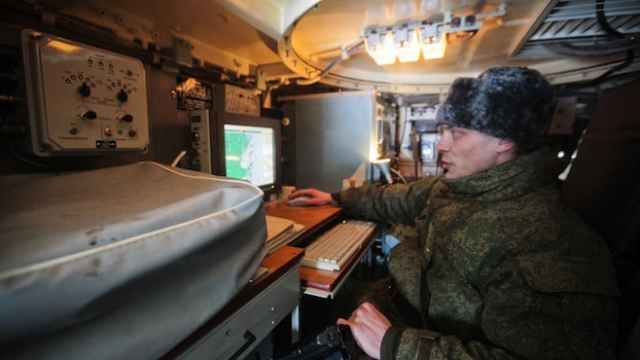The Russian government is considering doubling wages and issuing draft deferments for promising young workers to take jobs in the military-industrial complex amid a buildup of Russia's military strength, Industry and Trade Minister Denis Manturov said Tuesday.
"At the end of last year the average wage at enterprises in the military-industrial complex increased by 36 percent, and by 2020 this figure should be doubled," Manturov was quoted by news agency RIA Novosti as saying at a government meeting.
The increase comes at a time when Russia's economic recession and soaring inflation are driving average real wages down. Average defense industry wages after last year's increase are 35,000 rubles a month ($560) — 1,200 rubles ($60) above the national average.
The economic crisis has forced the government to cut federal budget spending sharply, but defense has so far been spared, shielding the defense industry from the heat of recession.
Russia is in the middle of a huge rearmament program that only became more important to Moscow as Russia's clash with the West over Ukraine flared last year.
But even if the military-industrial complex does not have to cope with lost revenues from the state, it is still struggling to overcome two decades of industrial and workforce decay.
The government is already investing in modernizing defense production facilities, but Manturov said the biggest problem now is the lack of qualified workers, low wages and poor housing.
To remedy the situation, Manturov on Tuesday proposed incentives for Russia's best and brightest to take jobs in one of Russia's 1,339 defense firms, such as higher wages, housing loans and five-year military draft deferments.
Deputy Prime Minister Dmitry Rogozin said the Defense Ministry would benefit from the draft deferments by gaining better-qualified conscripts with industry experience.
Rogozin used the example of Sevmash, Russia's largest military shipbuilder. If a young man was called into service after working on building a new nuclear submarine, "it would be logical if he served on this submarine," he said.
Rogozin also suggested that defense enterprises use extra space near their facilities to construct new and modern housing for their employees — a characteristically Soviet practice of workforce management.
Contact the author at m.bodner@imedia.ru
A Message from The Moscow Times:
Dear readers,
We are facing unprecedented challenges. Russia's Prosecutor General's Office has designated The Moscow Times as an "undesirable" organization, criminalizing our work and putting our staff at risk of prosecution. This follows our earlier unjust labeling as a "foreign agent."
These actions are direct attempts to silence independent journalism in Russia. The authorities claim our work "discredits the decisions of the Russian leadership." We see things differently: we strive to provide accurate, unbiased reporting on Russia.
We, the journalists of The Moscow Times, refuse to be silenced. But to continue our work, we need your help.
Your support, no matter how small, makes a world of difference. If you can, please support us monthly starting from just $2. It's quick to set up, and every contribution makes a significant impact.
By supporting The Moscow Times, you're defending open, independent journalism in the face of repression. Thank you for standing with us.
Remind me later.





